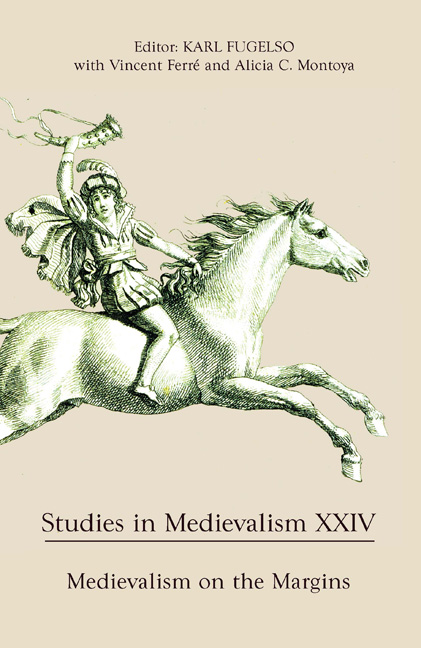Book contents
- Frontmatter
- Acknowledgments
- Contents
- List of Illustrations
- Volume XXIV 2015
- Editorial Note
- I Medievalism on the Margins: Some Perspective(s)
- II Trans-Atlantic Medievalism(s)
- III Other Interpretations
- 13 The Middle Ages Are within Your Grasp: Motor Neurons, Mirror Neurons, Simulacra, and Imagining the Past
- 14 Alfred the Little: Medievalism, Politics, and the Poet Laureate
- 15 Swords, Sorcery, and Steam: The Industrial Dark Ages in Contemporary Medievalism
- 16 Modern-day Ring-givers: MMORPG Guild Cultures and the Influence of the Anglo-Saxon World
- Contributors
16 - Modern-day Ring-givers: MMORPG Guild Cultures and the Influence of the Anglo-Saxon World
from III - Other Interpretations
Published online by Cambridge University Press: 05 December 2015
- Frontmatter
- Acknowledgments
- Contents
- List of Illustrations
- Volume XXIV 2015
- Editorial Note
- I Medievalism on the Margins: Some Perspective(s)
- II Trans-Atlantic Medievalism(s)
- III Other Interpretations
- 13 The Middle Ages Are within Your Grasp: Motor Neurons, Mirror Neurons, Simulacra, and Imagining the Past
- 14 Alfred the Little: Medievalism, Politics, and the Poet Laureate
- 15 Swords, Sorcery, and Steam: The Industrial Dark Ages in Contemporary Medievalism
- 16 Modern-day Ring-givers: MMORPG Guild Cultures and the Influence of the Anglo-Saxon World
- Contributors
Summary
In modern, massively multiplayer online role playing games (MMORPGs), players are creating and challenging normative cultural structures as they establish, sustain, and cultivate new virtual societies. Moreover, many of these games rely heavily on medieval aspects for both their game content and their community frameworks. As Oliver Traxel notes, nearly all MMORPGs include some aspect of the medieval: “Some of the latter [computer games] are grounded in thorough research on the historical circumstances of the Middle Ages, but many more depend on overt fiction from or about the period, and almost all incorporate at least some pseudo-medieval elements.” Thus, it is no surprise to find many types of modern medievalism influencing MMORPG game lore; even decidedly un-medieval games – like Star Wars: The Old Republic, DC Universe Online, and EVE Online – frequently rely on various forms of medievalism. There has been recent critical interest in the many and varied reimaginings of the medieval world in modern video games, and we know now that many social structures of the medieval world are replicated in modern MMORPGs gaming communities. For example, Edward Castronova has recently explored the cultural effects of online games and concludes: “the same institutions that make norms effective in the real world make them effective in the synthetic world. In general, the forces that create and evolve institutions are human social forces, and they will operate the same way whether the humans find themselves on Earth or on some cybernetic version of Pluto.” In addition, Lauryn S. Mayer has explored the ways in which neo-medieval MMORPGs reproduce restrictive gender norms while they simultaneously “provide the foundation for radical challenges to traditional concepts of gender and its embodiments.” Of particular interest to this study is Mayer's exploration of the ways that in MMORPGs “the implicit rules of governing culture […] make some of the less-articulated but still powerful normative forces behind that culture more visible.” Although Mayer's work focuses on representations of gender, her speculation that modern video games can both fortify and undermine cultural norms by making them “more visible” opens up significant avenues of inquiry for exploring the representation of other cultural phenomenon in modern video games.
- Type
- Chapter
- Information
- Studies in Medievalism XXIVMedievalism on the Margins, pp. 217 - 236Publisher: Boydell & BrewerPrint publication year: 2015



